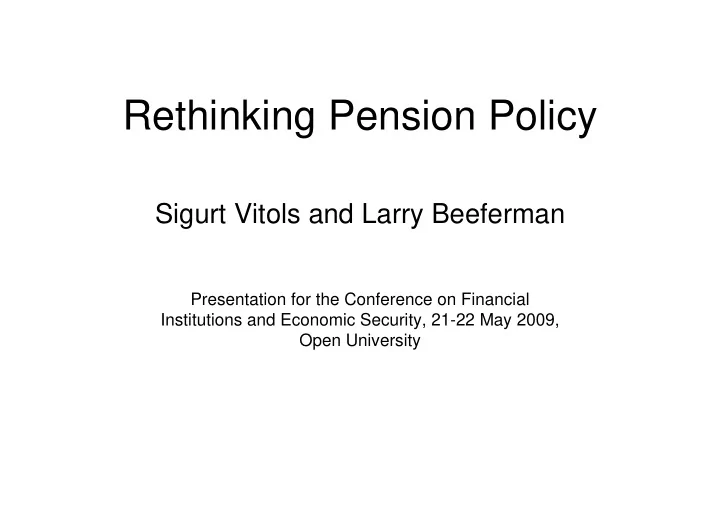

Rethinking Pension Policy Sigurt Vitols and Larry Beeferman Presentation for the Conference on Financial Institutions and Economic Security, 21-22 May 2009, Open University
Main Argument • Primary goal of pension policy: to provide adequate retirement income FOR ALL • A key performance benchmark is the elderly poverty rate • Current pension arrangments in most countries fall (far) short of this goal - especially post financial crisis • Fundamental reform is necessary to achieve goal of economic security
Poverty Rates in the EU 15
Factors Contributing to Elderly Poverty • Inadequate overall retirement savings levels/intergenerational transfers • Inadequate redistribution (Bismarkian dependence upon lifetime earnings) • Inequality in wages + lifetime work experience • Both overall savings level + level of redistribution need to be addressed to provide economic security to elderly
Key Questions in Pension Policy • Three pillars: state, company or individual • Defined benefit or defined contribution • Minimum benefit level in state pensions? • Pay As You Go (PAYG) or funded?
Historical Trends in Pensions Pre WWII • Basic State Pensions (starting w/ Bismark) • Paternalistic HRM – Company Pensions Post WWII • Expansion in State Pensions • Union Bargaining Power over Company Pensions • Tax Benefits for Individual Pensions Thatcher + After • Reduction in Redistributive Role in State Pensions • Increased emphasis on virtues of private pensions (particularly individual)
Criticisms of State Pensions • Neoliberal critique of state provision • Demographic changes put pressure on „generational contract“ • Limited flexibility in saving choices • Allocative efficiency (particularly in PAYG) • Social democratic critique of work experience orientation
Criticisms of Company Pensions • Voluntary provision + long vesting periods = no universal coverage • Cost pressure on companies w/ pensions • Trend from DB to DC shifts risks to workers • Procyclical effect (particularly in equities) • Double risk for workers (loosing job + pension) • Changes in corporate ownership weaken company responsibility • Massive underfunding due to financial crisis
Criticisms of Individual Pensions • Inadequate savings rate • Inadequate risk diversification • Overall risk too high or too low • High administrative costs • Lack of transparency in savings vehicles
Rethinking State Pensions • Financial crisis underlines the case for state pensions • Attractions of the Swedish reform: universal coverage, increased levels + individual DC component (in most cases choice delegated to default pension plan) • Reform of US-style system – increase benefit levels + state-administered 401k‘s
Rethinking Company Pensions • Legislative mandate for supplementary pensions? • Multiemployer/industry/joint national pension systems (a la Taft Hartley + Metallrente)? • Expand local/state/regional public pension systems to administer private plans? • Better coverage for labor markets with higher turnover • Universal applicability avoids competitive disadvantage for companies w/pensions
In Conclusion • Current pension arrangements do not provide adequate economic security to many elderly • Shift away from private individual + single employer to multiemployer and multilevel state plans is needed • Mandatory participation needed to boost savings levels……plus more equal distribution of wages would help
THANK YOU FOR YOUR ATTENTION!!!!!!!!
Recommend
More recommend